
Crafting a Compelling Teaching Personal Statement
Your teaching personal statement needs to give an insight into your personality, teaching style & unique qualities only you hold. In this article, we’ll guide you through the process of writing a compelling teaching personal statement.
The best personal statements are more than just a list of experiences and achievements. A personal statement which tells a compelling story will always compel the reader to want to find out more. If you keep your philosophy as the central theme and ensure that you use examples of practice which link back to that, it will ensure that your personal statement is a coherent and interesting piece of writing.

What Inspired You:
Begin by reflecting on what motivated you to become a teacher. Headteachers want to understand your background, inspiration, the reason you trained as a teacher and why you want to teach your specialism. Highlight your passion for teaching and your genuine desire to make a positive impact on students’ lives.
Showcase Key Achievements:
Highlight your career achievements, qualifications and teaching milestones that you’re most proud of. Demonstrate your ability to drive student progress and results through concrete examples throughout your teaching personal statement. If you’re an early career teacher, discuss your teaching placements, voluntary work, or even include any quotes from observation reports.
Showcase Teaching Skills:
Demonstrate your teaching skills by providing specific examples. Discuss successful teaching strategies you’ve employed, innovative lesson plans you’ve created, or how you’ve adapted to meet the needs of diverse learners. Highlight any extracurricular involvement, such as coaching sports teams or leading clubs, which showcases your dedication to students’ holistic development.
Keep It Concise and Well-Structured:
Teaching personal statements should be clear, concise, and well-structured. Aim for a maximum of 500-600 words. Use headings or bullet points to organize your content. Start with a captivating opening paragraph and conclude with a strong summary of your qualifications and enthusiasm for teaching.
Proofread and Edit:
Thoroughly proofread your teaching personal statement to eliminate grammatical errors, typos, or awkward phrasing. Consider seeking feedback from mentors, colleagues, or friends to ensure clarity and impact. Editing is crucial to present yourself as a professional and detail-oriented teacher.
Show Enthusiasm:
Infuse your teaching personal statement with enthusiasm and optimism. Convey your passion for teaching, showcase your qualifications, and demonstrate your commitment to fostering student growth. A positive and enthusiastic tone can be infectious and leave a lasting impression.
To conclude, your teaching personal statement is your chance to shine as a teacher. Get personal. Write about what makes YOU in the classroom.
For further support and tips, please reach out to Gemma Yates.
If you’re an ECT, click here for tips on how to land your ECT role
If you’re an experienced teacher looking to accelerate your career, click here
Latest Updates

Advance Your Teaching Career

A How-to Guide: Landing Your ECT Role
0203 621 6321
Copyright © 2024 Ethos Education | All Rights Reserved | Web Design Surrey
Privacy Overview
- Applying to Uni
- Apprenticeships
- Health & Relationships
- Money & Finance
Personal Statements
- Postgraduate
- U.S Universities
University Interviews
- Vocational Qualifications
- Accommodation
- Budgeting, Money & Finance
- Health & Relationships
- Jobs & Careers
- Socialising
Studying Abroad
- Studying & Revision
- Technology
- University & College Admissions
Guide to GCSE Results Day
Finding a job after school or college
Retaking GCSEs
In this section
Choosing GCSE Subjects
Post-GCSE Options
GCSE Work Experience
GCSE Revision Tips
Why take an Apprenticeship?
Applying for an Apprenticeship
Apprenticeships Interviews
Apprenticeship Wage
Engineering Apprenticeships
What is an Apprenticeship?
Choosing an Apprenticeship
Real Life Apprentices
Degree Apprenticeships
Higher Apprenticeships
A Level Results Day 2024
AS Levels 2024
Clearing Guide 2024
Applying to University
SQA Results Day Guide 2024
BTEC Results Day Guide
Vocational Qualifications Guide
Sixth Form or College
International Baccalaureate
Post 18 options
Finding a Job
Should I take a Gap Year?
Travel Planning
Volunteering
Gap Year Guide
Gap Year Blogs
Applying to Oxbridge
Applying to US Universities
Choosing a Degree
Choosing a University or College
Personal Statement Editing and Review Service
Guide to Freshers' Week
Student Guides
Student Cooking
Student Blogs
- Top Rated Personal Statements
Personal Statement Examples
Writing Your Personal Statement
- Postgraduate Personal Statements
- International Student Personal Statements
- Gap Year Personal Statements
Personal Statement Length Checker
Personal Statement Examples By University
Personal Statement Changes 2025
- Personal Statement Template
Job Interviews
Types of Postgraduate Course
Writing a Postgraduate Personal Statement
Postgraduate Funding
Postgraduate Study
Internships
Choosing A College
Ivy League Universities
Common App Essay Examples
Universal College Application Guide
How To Write A College Admissions Essay
College Rankings
Admissions Tests
Fees & Funding
Scholarships
Budgeting For College
Online Degree
Platinum Express Editing and Review Service
Gold Editing and Review Service
Silver Express Editing and Review Service
UCAS Personal Statement Editing and Review Service
Oxbridge Personal Statement Editing and Review Service
Postgraduate Personal Statement Editing and Review Service
You are here
- Mature Student Personal Statements
- Personal Statements By University
- Accountancy and Finance Personal Statements
- Actuarial Science Personal Statements
- American Studies Personal Statements
- Anthropology Personal Statements
- Archaeology Personal Statements
- Architecture Personal Statements
- Art and Design Personal Statements
- Biochemistry Personal Statements
- Bioengineering Personal Statements
- Biology Personal Statements
- Biomedical Science Personal Statements
- Biotechnology Personal Statements
- Business Management Personal Statement Examples
- Business Personal Statements
- Catering and Food Personal Statements
- Chemistry Personal Statements
- Classics Personal Statements
- Computer Science Personal Statements
- Computing and IT Personal Statements
- Criminology Personal Statements
- Dance Personal Statements
- Dentistry Personal Statements
- Design Personal Statements
- Dietetics Personal Statements
- Drama Personal Statements
- Economics Personal Statement Examples
- Education Personal Statements
- Engineering Personal Statement Examples
- English Personal Statements
- Environment Personal Statements
- Environmental Science Personal Statements
- Event Management Personal Statements
- Fashion Personal Statements
- Film Personal Statements
- Finance Personal Statements
- Forensic Science Personal Statements
- Geography Personal Statements
- Geology Personal Statements
- Health Sciences Personal Statements
- History Personal Statements
- History of Art Personal Statements
- Hotel Management Personal Statements
- International Relations Personal Statements
- International Studies Personal Statements
- Islamic Studies Personal Statements
- Japanese Studies Personal Statements
- Journalism Personal Statements
- Land Economy Personal Statements
- Languages Personal Statements
- Law Personal Statement Examples
- Linguistics Personal Statements
- Management Personal Statements
- Marketing Personal Statements
- Mathematics Personal Statements
- Media Personal Statements
- Medicine Personal Statement Examples
- Midwifery Personal Statements
- Music Personal Statements
- Music Technology Personal Statements
- Natural Sciences Personal Statements
- Neuroscience Personal Statements
- Nursing Personal Statements
- Occupational Therapy Personal Statements
- Osteopathy Personal Statements
- Oxbridge Personal Statements
- Pharmacy Personal Statements
- Philosophy Personal Statements
- Photography Personal Statements
- Physics Personal Statements
- Physiology Personal Statements
- Physiotherapy Personal Statements
- Politics Personal Statements
- Psychology Personal Statement Examples
- Radiography Personal Statements
- Religious Studies Personal Statements
- Social Work Personal Statements
- Sociology Personal Statements
- Sports & Leisure Personal Statements
- Sports Science Personal Statements
- Surveying Personal Statements
- Teacher Training Personal Statements
- Theology Personal Statements
- Travel and Tourism Personal Statements
- Urban Planning Personal Statements
- Veterinary Science Personal Statements
- Zoology Personal Statements
- Personal Statement Editing Service
- Personal Statement Writing Guide
- Submit Your Personal Statement
- Personal Statement Questions 2025
- Personal Statement Changes 2024
Teacher Training Personal Statement Examples
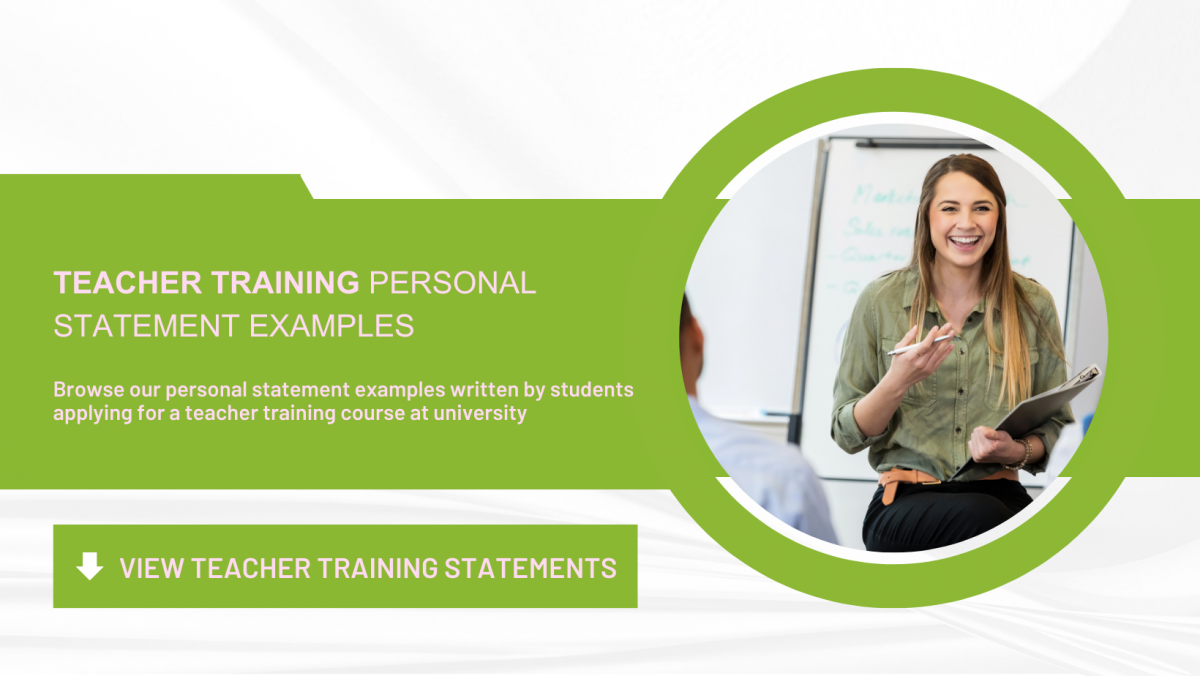
What is a teacher training personal statement?
The teacher training personal statement is your opportunity to let training providers know about your qualities, skills and expertise, and why you want to teach.
While your application form briefly outlines your qualifications, skills and work experience, your teaching personal statement is where your personality shines through.
Take your time with it, be prepared to receive constructive feedback and write a few drafts before you send it off.
How do I write a good teacher training personal statement?
To help you write a successful teacher training personal statement, we recommend you include:
- use examples to back everything up, based on your teaching experience so far
- tailor your personal statement according to the age group you wish to teach
- write using concise English, using first person terms such as 'my' and 'I'
- be original and honest - don't embellish the truth or lie outright
- avoid clichés and general statements, such as 'since a young age' or 'I've always wanted to be a teacher'
- demonstrate your passion and enthusiasm for teaching.
You have up to 4,000 characters to write a memorable opening, middle and conclusion.
Don't waste your valuable space on writing about things that are already on your UCAS form elsewhere, such as your qualifications.
What should I include in my teacher training personal statement?
When planning out your personal statement, ask yourself what it is your training providers are looking for. Make sure your statement answers the following questions:
- Why do I want to teach? - show that you know about the challenges and rewards of teaching, and remember that everything has its ups and downs. Maybe talk about any lessons you have observed/taught, what went well and how you would have improved on them. Discuss teaching styles used and the use of technology in the classroom.
- Why do I want to teach this age group/at this level? - what appeals to you, and what experience do you have teaching these students/children?
- What are my strengths? - include the relevance of your degree and subject knowledge.
- What experience do I have? - include any experience you have of volunteering with children, such as teaching a sports team, youth work or working at a summer camp? Give examples of how this helpd develop your teaching skills.
- What personal skills/abilities do I have? - these might include research, creativity, time management, IT skills, problem solving, managing people, organisational skills, listening skills, leading or working in a team. To strengthen your application, make sure you back everything up with examples.
- Are there are any location restrictions? - if you don't currently live in the UK, why do you want to study here? Are you willing to move away from your current home town/city for your degree?
You only have up to 47 lines (4,000 characters including spaces) in which to persuade your chosen initial teacher training (ITT) providers to offer you an interview. The statement must be concise, enthusiastic and sell your potential to be a successful teacher.
For more help and advice on what to write in your teacher training personal statement, please see:
- Personal Statement Editing Services
- Personal Statement Tips From A Teacher
- Analysis Of A Personal Statement
- The 15th January UCAS Deadline: 4 Ways To Avoid Missing It
- Personal Statement FAQs
- Personal Statement Timeline
- 10 Top Personal Statement Writing Tips
- What To Do If You Miss The 15th January UCAS Deadline.
What is a teacher training degree?
Teacher training degrees combine the study of curriculum subjects with learning teaching techniques and putting these into practice during hands-on school placements. The course leads to QTS (qualified teacher status) to enable you to teach in a school or college.
How long is a teacher training course?
To teach in England and Wales you need to gain QTS. You will obtain this on an ITT programme, which could be school or university-based and takes approximately one year to complete.
How do I become a teacher with a degree?
To teach as a qualified teacher in England, you'll need qualified teacher status (QTS). If you already have a degree, you can complete a postgraduate teacher training course to achieve this. Additionally, you'll need to have a GCSE at grade C/4 in maths and English, as well as science if you want to teach primary.
Can I train to be a teacher without a degree?
Unfortunately no - you cannot become a teacher without a degree.
But if you are an undergraduate or have a degree in a different subject than what you want to teach, there are options to help you get into a teaching career.
Will I get paid for teacher training?
There are three types of funding available for teacher training - depending on your circumstances, you could receive all three:
- Tax-free bursary or scholarship.
- Tuition Fee Loan and Maintenance Loan.
- Extra financial support if you're a parent, have an adult dependant or a disability.
Further information
For more tips and advice on teacher training personal statements, please see:
- GetIntoTeaching
- The Complete University Guide
Related resources
Teacher training interview questions.

Find out more
Applying For Teacher Training Courses

6 Personal Statement Writing Tips

How To Apply To University

UCAS Adjustment: How Does It Work?

A Level Results Day

Clearing Guide


- Tes Institute
How to write a teacher training personal statement or Initial Teacher Training application
Teacher training personal statements: the dos and don'ts
An Initial Teacher Training (ITT) or teacher training personal statement is a key part of any initial teacher training application – it's your chance to sell yourself.
Your personal statement gives teacher training providers an opportunity to find out more about you – your motivations for pursuing a career in teaching, your reflections on any school experience you have and the skills, competencies, values and attitudes that you bring to the table. What can you offer teaching? What will make you an outstanding teacher who will inspire, engage and challenge pupils?
A teacher training personal statement shouldn’t be a list of all your jobs or qualifications – those are set out elsewhere in your application. Nor should it simply be a factual account of what you have observed or what you did in a classroom during your school experience. While it's important to give a brief context of this, it's much more important to explain what you learnt during your time in school; skills you developed and reflections on what you observed or did. Teacher training providers or ITT partnership schools need to see that you have thought about your experience carefully.
It's also worth reiterating how important it is to check your spelling and grammar. You're going to be in charge of educating the next generation – you must have strong written communication skills.
Examples can be a great way of demonstrating what you have learnt
Steer away from overusing general teaching related statements such as “I’ve always wanted to work with children”, especially when writing a primary school teacher training personal statement. Obviously, teacher training providers want to see that you have an interest in working with children but this can be demonstrated through your reflections on what you learnt during any school or similar experience and what you found rewarding about the work.
Examples can be a great way of demonstrating what you have learnt. Think about the skills that make a good teacher and give examples of any relevant projects you've worked on or any children you've worked with (always remember to anonymise the people involved). What was challenging about the situation, what did you learn and what were the outcomes you achieved?
By all means draw on skills you've gained elsewhere, maybe in a different career field or in your own education or family life. If you've overcome obstacles or challenges that you believe show your resilience and adaptability, draw on that experience to demonstrate how you would handle the pressurised environment of teaching and working in a school.
Your teacher training personal statement should be coherent and well-structured
If you hold a non-subject specific degree and you know you have some gaps in your subject knowledge, it’s a good idea to mention this in your teaching training personal statement but to also offer the provider a solution. You can demonstrate that you've done some research and you've already considered a solution to this challenge by mentioning that you would like to do a subject knowledge enhancement (SKE) course prior to starting your teacher training to bring your knowledge up to the level you need to teach.
Find out more about about SKE
There are plenty of guides on how to write a personal statement for teacher training which outline the basics, but the most important thing remains your own personal reasons for applying. Be clear about what motivates you. A personal statement that suggests you haven't thought through your reasons for going into teaching will not help your application to succeed. Teacher training providers are less likely to be concerned about someone who has had a diverse career but is now committed to teaching than someone who says they have always wanted to teach but can’t give clear reasons why. If you’re not currently based in the UK, include reasons why you want to pursue your teaching career here. And last but definitely not least, your personal statement should be coherent and well-structured.
In summary:
- Draw on your experiences (especially teaching experience) to show what you've learnt and what you will bring to the teaching profession
- Evidence your skills , competencies and values, with relevant examples if possible
- Be clear about your motivations for going into teaching
- Make sure your statement is coherent and accurate
- Don’t copy! Your statement should be entirely your own work; do not copy online examples.
Good luck! Further advice from UCAS can be found here .
Tags in this post
- Teacher training
Dark background
Light background
Text only mode
How to get into teaching
How to write your teacher training personal statement
Your teacher training personal statement should express why you'd make a great teacher and spell out your experiences, qualities and skills. We've got the inside track from Admissions Tutors on how to go about writing a good teacher training personal statement, what to do and what not to overlook...
6 minute read
Share to: Facebook , LinkedIn , Twitter
Let's start with a look at when to apply for teacher training. Places on teacher training courses are filled on a first come first serve basis. This is due to two factors. Firstly, the Department for Education set the maximum number of trainees on some courses. But the thing that really limits the number of places available is ensuring that there are enough school placements for all trainees. Training providers can only recruit up to a number that is manageable in terms of providing the trainees with the placement experiences they need.

Places for the most popular subjects tend to go early, for example, Physical Education (PE), Primary and Psychology. Shortage subjects such as Chemistry, Computing, Maths and Physics don’t fill up so fast.
The route you are taking into teaching may also influence when you apply. School Direct is run by the schools themselves and they can only take as many trainees as they can train within their schools. They may only have the one place available for your chosen subject and once those placements are gone, they’re gone. Universities tend to have larger and wider networks of partner schools which provide school placements. This gives them more options for finding school placements so they may have places available for longer. Unlike School Direct you don’t get to choose exactly which school you go to, though they’ll try to match your school placements to your preferences as much as possible. If you apply late you run the risk that all the placements are gone.
So, you want to apply as soon as you can, with a brilliant personal statement that reflects who you are and why you want to become a teacher. So, what does that look like?
Your teacher training personal statement broadly needs to convey four things:
- Your passion for wanting to become a teacher and commitment to the profession.
- Your reasons for wanting to teach your chosen subject.
- The skills and experience that you’ll bring to the role of teacher.
- Your awareness of the realities of what lies ahead - it’s a challenging but rewarding role so you need to be realistic about this and be aware of some of the hot topics facing the sector.
Kate Brimacombe, Associate Professor of Education and Associate Director of the Teacher Education Partnership at Plymouth Marjon University, explains what she is looking for in a teacher training personal statement:
“It's really lovely to get something that's individual and firstly I want to see that passion for wanting to work with children. You absolutely can get that across - it comes off the page.
“It can’t feel half-hearted, it needs to feel committed. If independence, motivation, and self-reliance don’t sing off the page, then that's an error in a sense. You need to get your personality into the written word, I’m looking for that fire that says ‘this is absolutely what I want to do’. One common mistake is being too short so that it doesn’t get that passion across. The lack of content and desire are the main reasons I don't shortlist candidates.”
You must convey why you want to teach your subject. What is your expertise? Why do you love it? What are the challenges facing teachers of your subject? Why do you want to teach this? Think about the age group you’ll be teaching and discuss why you want to teach them. What relevant experience do you have? How does your experience to date influence your thinking?
Ultimately, you’ve got to inspire others to love your subject, so be clear about how your own relationship to it is going to enable this.
The ingredients of a convincing teacher training personal statement are:
- Passion for teaching. Express your drive and fire on the page.
- Be individual. Stand out in a positive light; one tip here is not to waste characters on quotes, they don’t say anything about you.
- Convey your desire to work with children. Explain where this comes from.
- Prove it. Include the things you have actively done, what you’ve learnt from real life experiences in schools and/or working with children, and what you got out of it.
- Demonstrate the qualities of a teacher. Point out your commitment, empathy, independence, innovation, motivation, patience, self-reliance, and tip-top organisation skills.
- Depth. Don’t cut it too short, you’re allowed up to 4000 characters which is around 600-700 words, so write until you’re thereabouts, and then edit it so that it reads even better.
In addition, for a strong personal statement you’ll want to demonstrate some awareness of the national curriculum for your subject and then highlight how your subject knowledge maps to it.
Back to Kate for another crucial tip: “The other big thing is that we’re checking the accuracy of your spelling and grammar, it must be correct if you’re going to be a teacher. To be fair, we don't get a lot of mistakes because I think people understand that expectations around written and verbal communication are high in teaching.”
Some aspiring teachers know they want to teach but are uncertain on the age group or subject. For example, maybe you love sport and are keen to be a secondary PE teacher, but you also enjoy working with younger children at sports clubs so you’re feeling split. In this scenario, try to settle this before you apply but if you can’t then write honestly about the situation and take extra care to ensure that neither option comes across being the fallback one that you’re not really committed to.
The magic ingredient: Examples from your own experience
There's no one way to structure your teacher training personal statement but be sure to back up every point you make with evidence. A great way to do this is give real life examples of what you actually did, and what you learned from it. It’s not enough to just list your work experience, you need to explain what you learned and how this experience will help you as a teacher.
You don’t need school experience to apply for a teaching course, though it helps. But if you don’t have school experience then you at least need some transferable skills, so any other experience of working with children is valid here, things like helping with sports teams and youth clubs are valid too. Use your examples to demonstrate the skills you’d bring to the role of teacher.
You could also refer to a teacher who made a difference to you at school, or who influenced your love of working with children and helping them to learn.
By discussing examples, you can also demonstrate that you are realistic about the role, in that is challenging as well as rewarding. For example, you might discuss a session you observed or taught, reflecting on what went well, how you adapted to the situation and how you would improve on it.
This is how to make effective use of real life examples, according to Julie Stevens, course leader for PGCE Secondary Education at Plymouth Marjon University: “I want to read about how you’ve helped a pupil to make progress. What did you change? How did you recognise they weren’t learning? What did you adapt to help them understand? Maybe you modelled it or talked it through? How did the child respond? You might talk for example about why a child was messing around or why a seating chart was put together in a certain way. It’s really encouraging when a candidate offers insights into teaching and that sense of self-reflection”.
You can talk about that examples that demonstrate transferable skills. For example, maybe you had to be resilient to get your Duke of Edinburgh award, maybe you’re a leader on the sports field or maybe you’re a dedicated musician with the music exams to prove it?
In addition, the way you talk about children is really important, the training provider needs to know that you see them as individuals and that you want to help them become independent thinkers. Back to Julie again for more about this: “I want to see candidates who talk about children as individuals and how you can help them make the best progress they can. Helping young people to make decisions for themselves and become independent learners, so that they take responsibility for their own success is essential for adulthood.
"It’s great when someone can talk about innovative things, like how to use social media for good outcomes. Anything like that is powerful because it means they understand our role as educators – we aren’t just filling them with knowledge, we're trying to get children and young people to understand how to develop themselves.”
Get your referee geared up
References really do matter. Julie and Kate report that in practice most of barriers to shortlisting a candidate come not from the personal statement, but from references that are too short. They’ve seen references as short as three lines and that doesn’t tell them enough about you and your suitability for a career in teaching. You could be an impressive candidate, but you can’t be offered a place until your reference checks out.
If you’re applying for undergraduate teacher training through UCAS then one reference is required. If you’re applying for postgraduate teacher training then you’ll need two references. If you’re at university, or have been within the past five years, then one reference must be from someone at your university. The other reference can be from someone who knows you from work, and if you’re applying for School Direct then one of your references must come from your current employer.
A good reference says good things about you and backs up some of qualities and skills you’ve outlined in your personal statement. Your referee needs to talk about your character and why they think you could be a great teacher. The training provider is looking for insight; a different perspective on you, and hopefully one that that verifies the impressions they’re taking from your statement.
You can do a lot to make sure your reference is on point. First ask your referees if they are willing to be your referee and if they think you’ve got the potential to be a good teacher. Next you need to arm them with all the arguments as to why you’ll be a good teacher, they probably don’t know everything you do. Ideally they would read your personal statement so that they can write a reference that complements it.
If applicable, ask your referee to comment on your academic abilities, including your predicted grades. If possible, go through the reference with your referee as you might see something they’ve missed. If so, ask if they are willing to add it, it’s up to them but you can suggest things.
A good teacher training personal statement shows passion and love for teaching, as well as that you’ve done some research and that you’re dedicated to teaching career. Show your personality; show them the teacher you could be. @marjonuni
Back to Kate for closing advice: “Speak with honesty and speak from the heart. I’m looking for passion. I'm looking for somebody I think the has the potential. Then when you come to interview, I already know that you have that passion and so you just need to add the shine to that and tell us more about it in-person, one to one. In that way your teacher training personal statement is the stepping stone into the interview, if it does its job then we’ll be excited to find out more about you”.
You’ve got this. Follow the advice above and you’ll have a brilliant teacher training personal statement in the bag. The next step will be your teacher training interview, so why not check out our articles on how to ace your teacher training interview and teacher training interview questions .
Share this page on

- PGCE 3 – 7
- PGCE 5 – 11
- Assessment Only
- HLTA Status Course
- Our Schools
- Personal Statement Tips
TIPS FOR PERSONAL STATEMENT
How to write an effective personal statement.
Please take time to read the following information which is designed to help you to write your personal statement effectively.
• Remember , the function of the personal statement is to secure an interview • Wring value out of every sentence you put in, cut the waffle • Be clear – don’t make assumptions about the reader’s knowledge • Use concrete examples . If you did something, say exactly what you did (e.g. As a TA I have supported children to develop a range of skills in mathematics. I used a cookery lesson to teach my Y5 pupils about weighing and measuring and have taught volume and capacity to Y1 pupils as part of a topic on looking after our fish) • Say what you learned (e.g. Whilst observing in a Y3 class, I was impressed at the way the pupils responded to the Learning Objectives. I understand how important it is to make these explicit as it helps the children to …) Broadly, the statement should cover these areas: • Why you want to become a teacher • your transferable skills, knowledge and experience relevant to teaching and what they will enable you to offer a school • your philosophy of education – what it’s all about (and this might be where you want to include your thoughts on things like inclusion); • what other transferable skills, knowledge and experience you can offer, including extra-curricular. • Try to include something ‘desirable’ – that little something which will make your application stand out e.g. Willing and able to coach the school football or netball team.

Final Do’s and Don’ts
Don’t: Go over the character limit – the form will just cut you off mid-sentence. Do: • Keep a copy of your application form – you will be asked questions based on it at interview • Draft your statement on Word first then cut and paste. • Proof read very carefully – errors in written English are frowned upon • Get someone else to read over your form before you press send Good Luck!
“LDBS SCITT was genuinely the best year of my life.” – Jade Corrick
© 2024 | Teaching London: LDBS SCITT | 2 West End Lane, Kilburn, London, NW6 4NT | 0207 932 1126 | [email protected]
beta This is a new service - your feedback will help us to improve it.
- Jobseeker guides
How to write a teacher personal statement
What experience do you have, are you engaged in teaching theory and research, are you up to date on safeguarding statutory guidance, what are your skills and qualities, how can you contribute to wider school life, search for roles.
Your personal statement is your first opportunity to show the school you’re a great fit for the job, and gets you closer to being shortlisted for an interview. The more you show how your skills and interests match the school’s ethos and values, the better. We’ve spoken to a range of teachers to get their top tips for success.
Schools want to hear about your trainee experience with different subjects, key stages, types of school, and working with a range of pupils.
Think about your approach to teaching, how you keep pupils engaged, and how you communicate with different kinds of people (children, staff, parents and carers). Ensure you provide evidence for how you have improved student engagement and built positive relationships with pupils.
Schools will be interested in your approach to behaviour management, so think about your go-to strategies.
Think about any research that has affected your teaching practice. Explain what has worked well and if it didn’t, what you learnt.
You need to demonstrate your awareness of the importance of safeguarding and the requirements of Keeping Children Safe in Education . Include any examples of how you worked with a Designated Safeguarding Lead.
Are you a well-organised, confident, and motivated teacher? Say it, and provide examples! Schools are looking for great communicators, team players and relationship builders. Make sure you say how you create a positive learning environment, and consider skills like time management, organisation, and flexibility. Schools will also want to know how you overcome challenges.
Set yourself apart by showing how your hobbies and achievements could contribute to the wider school community. Could you run an after school club or organise school trips?
Search for roles on Teaching Vacancies now.
Cookies on Teaching Vacancies
We’d like to set additional cookies to understand how you use this service and help us improve it. We also use cookies set by other sites to help us deliver content from their services.

Top Tips for Writing Your NQT Personal Statement
While there are many moving parts when applying for a job as an Early Career Teacher (formerly known as an NQT), the most important of them all is your personal statement. The application form is for you to lay out your qualifications and skills. But your personal statement is where you can shine through as a candidate. It’s an opportunity to sell yourself, highlight your personality and explain why you would be an asset to their school.
It’s not an easy thing to write. But as many successful ECTs can attest each year, it’s certainly not impossible.
To give you the best chance to succeed, we’ve put together six top tips that will help you create a personal statement that lands you an ECT interview at your dream school.
1. Tailor your statement to each school
As an Early Career Teacher, you’re probably applying to a large number of schools at once. When you’re in the middle of your busy PGCE year, it might feel like a waste of valuable time to edit your personal statement for every job application. In fact, it’s the most important thing you can do.
Every school is different, and so every application you send should be different. Take the time to read the job advertisement carefully, have a look through their website, and their latest Ofsted report. Make a list of the exact requirements of the position, plus what is most important in the school’s ethos, and connect all these to your own passions and experience.
2. Craft a killer opening line
Just like a great novel, your opening sentence should stand out (for the right reasons). Effective personal statements often start with a brief explanation of what inspired them to become a teacher in the first place, or why they’re excited to be applying for this particular position.
3. Focus on the age group you will be teaching
Rather than saying you enjoy teaching a particular age group, show that you understand the challenges (and how to overcome them) that come with those particular students.
For example, if you’re applying for a job within a secondary school that has a sixth form, you might want to show how you have helped students with UCAS applications. Or if you’re applying for a primary position, you could demonstrate why it’s important to keep an element of play within your lesson plans.
4. Highlight how your experience has develop
A list of your working experience is a necessary part of your CV, but it’s not what schools are looking for in your ECT personal statement. Instead, you should use this as a space to give your own perspective on how all this experience has shaped your outlook as a new teacher.
Whether you want to talk about classroom time, a school trip, or coaching a youth sports team, specific examples of how your experiences have improved your skills will give the school’s hiring team a fuller picture of what you’d look like in the role.
5. Show off your strengths and skills
Use your personal statement to demonstrate what you, as an NQT, can bring to the school that no other applicants can. Achievements, professional goals, strategies you’ve developed; all of these will highlight what makes you unique and how you (and only you) can specifically help that school.
6. End on a strong note
Just like your pupils’ best essays, your conclusion should mirror your introduction. Reinforce your enthusiasm for teaching and the school your applying to.
Finally, before you click send, take the time to triple check your statement for any errors!
How to skip the ECT personal statement
If you’d prefer to avoid writing a personal statement altogether, then Teaching Personnel is here to help.
Our ECT Pool is the most efficient way for newly qualified teachers to start their careers. We will actively promote you to schools in your local area and help you prepare to nail the interview.
As soon as you register, our educational recruitment specialists will create a detailed profile of your skills, abilities, personality, and professional goals. We use all that information to match you to jobs at local schools. This saves you precious time writing out many detailed applications.
Find your first job as an Early Career Teacher – register for the ECT Pool today .
Join our ECT Pool ECT Jobs How does it work? Training Resources Blog Your Career
Sign up to posts.
Related jobs
£20 - 30 per hour
Location free text
Flexible Working
£20 - £29 per hour
Tutor/Intervention
Nottinghamshire
Description
Are you seeking a new opportunity starting in April/May 2024?Do you possess experience in providing 1:1 support to children?Are you capable of delivering engaging and effective 1-hour sessions to enha
JL540MansYTE671
Expiry Date

£10 - £19 per hour
£30 per hour and above
Are you an experienced educator or SEN specialist, looking for a new role? Here at TP Tutors, we have immediate start referrals, which involve supporting and working with young people with SEN and SEM

Early Years SEN Support
Job Title: SEN Tutor Location: South East England, Oxfordshire, DidcotJob Type: Temporary, Full-Time hoursPrimary Industry: Education and TrainingSalary: £20 - £30 Per hourJob Description: The SEN T
£20 - 25 per hour
Leatherhead
Job Title: KS3/4 Tutor Location: South East England, Surrey, LeatherheadJob Type: Temporary, Part-Time hoursSalary: £20 - £25 Per hourJob Description: We are currently seeking a KS3/4 Tutor to jo
Newark-on-Trent
Are you an exceptional tutor residing in the Nottinghamshire (Newark) area, driven by a passion to help students achieve their academic goals?Would you thrive in providing personalized 1:1 tuition to
JL540NewPLT670
£20 - 35 per hour
Job Title: Tutors needed in Wokingham Location: England, South East England, BerkshireJob Type: Temporary, expected to work Part-Time hoursPrimary Industry: Education and TrainingSecondary Industr
£77 - 90 per day
Less than £100 per day
Less than £500 per week
Teaching Assistant
Role: Teaching AssistantContract: Temp to Perm, FulltimeDaily Rate: £77 - £90Area: DoncasterNew exciting opportunities for April!!Are you looking for an exciting new opportunity and passion

£140 - 250 per day
Tower Hamlets
£100 - £199 per day
£200 - £299 per day
Role: KS1 Teacher Contract: Temp to Perm, Fulltime Salary: MPS/UPS Area: Tower HamletsTeaching personnel have an exciting opportunity for a KS1 teaching vacancy at an Ofsted-rated ‘GOOD’ school within
JADEBTOWERHAMLETS

£400 - 500 per week
£500 and above
Teaching Assistant We are looking for full-time and part-time Teaching Assistants to provide support within our Primary schools in Cambridge, Ely & Newmarket.Although experience is desirable, it is no

£30k - 40k per year
£20,000 - £29,999
£30,000 - £39,999
Supply Primary School Teachers needed!We are looking for supply, full-time and part-time Primary School Teachers for our Primary schools in Cambridge, Ely & Newmarket.Although experience is desirable,
Related posts

Content Type
Publish date
Planning for the Easter break? The Teaching Personnel payroll team wants to make sure you get paid on time. This table outlines the Easter 2024 payroll date, along with the corresponding deadline

Adam Davies
-min.jpg)
Table of Contents 1. Why do people become supply teachers? 2. What does it take to become a supply teacher? 3. How can I find work as a supply teacher? <!-- b--> 4. How shou
All your common questions about supply teaching answered

Alex Schulte
- Supply teaching

Special Educational Needs (SEN) provision in schools is a critical aspect of education that demands attention in 2024. According to the Department for Education, over 1.5 million pupils in England
Dive into the critical world of Special Educational Needs (SEN) provision with eye-opening statistics and real challenges faced by schools. Discover the importance of tailored support and the impact on learners.

Laura Williams is an education leadership coach with fifteen years of leadership experience in education across business, operations, HR, finance and governance. She is a former Business Manager, CO

Creating a safe and nurturing environment for pupils is paramount in the age of evolving social dynamics. One issue that has gained significant attention in recent years is the distinction between
Addressing the fine line between banter and bullying. Learn how seemingly harmless 'banter' can take a dark turn into hurtful bullying and the impact it has on students' well-being.

Shadow education secretary Bridget Phillipson addressed the Labour Party conference in October, where she announced plans to reform primary maths. Currently, one in four children leave primary school
Discover how Teaching Personnel and Ark Curriculum Plus are revolutionizing primary math education in Leeds, Liverpool, Preston, and Sheffield.

Mock exams are a crucial milestone in a pupil's academic journey, serving as a practice run for the real deal. As educators, you play a pivotal role in helping pupils navigate through these trial ex
Our educator's guide offers tips to prepare students for mock exams, helping them gain confidence and perform well.
- Lesson tips

In the fast-moving world of education, headteachers and schools face the challenge of ensuring a continuous and reliable supply of qualified teachers. Unforeseen teacher absences due to staff sickness
Learn how to build a resilient supply pool of trusted teachers with Teaching Personnel to combat shortages, reduce costs, and enhance education quality.
- Recruitment

Embarking on the journey to become an educator is both exhilarating and demanding. The Postgraduate Certificate in Education (PGCE) is crucial to achieving your teaching ambitions. The road ahead
In this comprehensive guide, brought to you by Teaching Personnel, we'll delve into valuable insights and actionable tips to help you navigate this transformative phase of your professional development.
- Early Career Teacher
- Teacher training
.jpg)
Teaching is a rewarding profession that plays a crucial role in shaping our society's future. However, it comes with its challenges. The workload can be demanding, which might sometimes lead to feelin
Teaching is a rewarding profession that plays a crucial role in shaping our society's future. However, it comes with its challenges. The workload can be demanding, which might sometimes lead to feelings of stress.
- Teaching Assistants
Register with us for work in schools across England & Wales
- Skip to content
How to write a great personal statement for a teaching job
Vinny Potter
Last updated: 7 Feb 2024, 16:23
Discover our top tips on what to include in your personal statement for a teaching job and how to present your skills, knowledge, experience and attributes.
Supported by:
Academies Enterprise Trust

Your personal statement is the heart of your application for work as an early career teacher and should be tailored for each role. For teaching applications this is sometimes also called a letter of application, but it is essentially the same thing. This is your opportunity to provide evidence of how you match the needs of the specific teaching job you are applying for, and earn yourself an invitation to the next stage, which is likely to be a selection day held at the school.
Writing tips for personal statements
See our example personal statement for primary school teaching, below. Imagine it was written in response to the following job advert:
We are advertising for a Year 3 Classroom Teacher. The successful candidate will be able to demonstrate the following:
- Committed to our school and our values
- Experience across a range of age groups
- Committed to reflection and improving practice
- Knowledge of the National Curriculum
- Excellent lesson planning
- Knowledge of assessment
- Good knowledge of SEND and positive interventions
- Positive approach to provide challenge and support student success
- Excellent behaviour management
- Good communication skills with parents
- Enthusiastic and creative approach to lessons
- Willing to contribute to the wider life of the school.
See our personal statement for secondary school teaching, below. Imagine it was written in response to the following job advert:
Country High School are advertising for an enthusiastic Secondary PE Teacher. The successful candidate will be able to demonstrate the following:
- Ability to adapt and tailor your approach for the differing needs of pupils
- Knowledge of the National Curriculum for your subject
- Knowledge of a wide range of sports
- Willing to engage in extra curricular activities and the wider life of the school
- Experience of supporting high ability students, as well as those who may be less able or motivated
- Ability to use data effectively
- Teach across all ability levels including SEND
- Ability to use Technology to enhance learning.
When completing a personal statement for a teaching job, you should typically observe the following guidelines:
- Do not write a generic statement. Instead use the person specification and job advert for the vacancy as a structure for your statement or consider using the government's Teachers' Standards if no person specification is provided.
- Do not exceed two sides of A4, unless otherwise instructed.
- Tailor your statement for each new application according to the nature of the school or LA and the advertised role.
- Always read any guidance provided – many schools and LAs will tell you how they want this section set out.
- Emphasise your individual strengths in relation to the role.
- For a pool application, make sure you give a good overview of your skills and experience.
- It is essential that you give specific examples of what you have done to back up your claims.
Primary school personal statement
Examples of a personal statements for a primary school teaching job.
Primary school personal statement example
Secondary school personal statement
See our example of a personal statement for a secondary school teaching job.
Secondary school personal statement example
What you should cover in your personal statement
When schools advertise graduate teaching jobs , they write a job description which states the essential attributes they are looking for. This is their marking criteria for the job. When they read your statement, they will usually score this based on their essential and desirable criteria. Therefore, you need to read their documents carefully to find the criteria and provide an example or evidence of each point. If the job advert does not include any documents which include their criteria, then you can use the following structure for your statement and use the Teachers’ Standards as a guide for the criteria they may be looking for.

Why you are applying for the role:
- Refer to any knowledge you have of the LA or the school, including any visits to the school and what you learned from them.
- Show you would be a good fit for the school. The best way to do this is to look at the school’s values and give an example of how you match these.
- Mention any special circumstances (for example, your religious faith) which you think are relevant.
Details about your course:
- Give an overview of your training course - including the age range and subjects covered - and any special features.
- If you are a PGCE student, mention your first degree, your dissertation (if appropriate), any classroom-based research projects and relevant modules studied. Also mention if you have studied any masters modules.
Your teaching experience:
- What year groups you have taught.
- What subjects you have covered.
- Your use and understanding of formative and summative assessment practices.
Your classroom management strategies:
- Give examples of how you planned and delivered lessons and evaluated learning outcomes, including differentiation, scaffolding etc.
- Explain how you have managed classrooms and behaviour.
- Detail your experience of working with assistants or parents in your class.
Your visions and beliefs about primary/secondary education:
- What are your beliefs about learning and your visions for the future? You could touch on areas such as learning and teaching styles and strategies.
- Reflect on key policies relevant to the age range you want to teach.
Other related experience:
- This can include information about any previous work experience.
- Include training activities you have carried out and ways in which your subject knowledge has been developed.
Other related skills and interests:
- Give details of any particular competencies, experiences or leisure interests. This will help the school to know more about you as a person and could ‘add value’ in a school environment.
- Any involvement in working with children (running clubs, youth work and summer camps) is particularly useful to include.
Aim to end on a positive note. A conclusion which displays your enthusiasm in relation to the specific application and teaching in general will enhance your application - but avoid general statements and clichés.
Written by Vinny Potter, St Marys University, Twickenham, July 2023

In partnership with
Occasionally targetjobs will work with another organisation to provide impartial careers content. This is to provide you with the most relevant information to make the best decisions about your future. As such, ‘in partnership’ content has been written or sourced by the partner organisation and edited by targetjobs as part of a content partnership.
People reading this also searched for roles in these areas:
- Graduate Jobs
- Graduate Schemes
- Internships
Related careers advice

We've got you

How to Write an ECT Personal Statement
Written by Dan
Last updated December 20, 2023
When you are applying for an Early Career Teacher position, one of the most important things that you will need to submit is your personal statement.
This document is your opportunity to introduce yourself to the selection committee and showcase why you would be a great addition to their school. To make sure that your statement stands out, follow these tips.
Related : For more, check out our article on Tips To Support ECTs In Their First Year here.
Table of Contents
Write A Unique Statement For Each School.
If you’re an Early Career Teacher, then you understand how important it is to edit your personal statement for every job application. It can be time-consuming, but it’s worth it in the long run. Each school is unique, so your application should reflect that.
Read the job advertisement, website, and latest Ofsted report carefully. Make a list of requirements for the position and what is most important to the school’s ethos. Connect your passions and experience to these things.
For example, if the job advertisement asks for someone who is ‘passionate about teaching’, think carefully about what experiences you have had that demonstrate your passion for teaching. It could be a time when you overcame a difficult challenge in the classroom or a moment when you made a real difference in a student’s life.
Opening Line
Your opening sentence is analogous to the starting line of an amazing novel–it needs to be attention-grabbing (for all the right reasons). Highly effective personal statements generally start with a short explanation of what originally inspired them to enter the teaching profession, or why they’re looking forward to applying for this precise position.
Be Specific
When discussing your experience, always try to be as specific as possible. For example, rather than just saying that you’ve worked with “disadvantaged students,” go into detail about what kind of disadvantage they faced and how you helped them to overcome it. This will give the selection committee a much better idea of your teaching style and capabilities.
Keep Your Target Audience In Mind When Writing
It’s more impactful to SHOW an employer that you understand the complexities and how to manage them instead of simply telling them which age group you prefer teaching.
For example, if you’re vying for a job at a secondary school with a sixth form, illustrate how you’ve assisted students in the past with UCAS applications. If primary schools are your thing, explain why keeping an element of playfulness is essential to successful lesson plans.
Demonstrate Your Enthusiasm
When you’re writing your personal statement, make sure to show enthusiasm for the role you’re applying to. This is especially important for Early Career Teachers, as they might not have as much experience in the classroom as other candidates.
One way to do this is by including examples of how you’ve gone above and beyond in your current role. Another way is to share how you plan on contributing to the school community if you’re successful in securing the position.
How Has Your Working History Developed Your Practice
Although including a list of your work experience on your CV is necessary, it shouldn’t take up much space on your ECT personal statement. The focus of this document should be on how all of this past experience has affected your perspective as a new teacher. Use examples of your prior experiences to show the school’s hiring team how you would excel in the role.
Outline Your Plans For The Future
If you’re an Early Career Teacher, then chances are you haven’t been in the field for too long. Even if you only have a few years of experience under your belt, that doesn’t mean that you can’t have long-term goals. Describing your plans for the future shows that you’re committed to the teaching profession and that you have a clear vision for your career.
Strengths and Skills
Show your potential employer what makes you the best candidate for the job by discussing your unique skills, experiences, and goals in your personal statement. Are you a whiz with technology? Do you have experience teaching in an inclusive environment? Are you trilingual? These are all qualities that would set you apart from other candidates and make you an asset to any school.
A Powerful Ending
Just as you would carefully revise one of your students’ best essays, make sure to proofread and edit your statement before sending it off. Be sure to express how much you love teaching and why the school you’re applying to is a perfect fit for what you’re looking for. You want the selection committee to remember you for all the right reasons, so make sure your statement leaves a lasting impression.
By following these tips, you can be confident that your Early Career Teacher personal statement will make you stand out from the rest of the pack.
Check For Mistakes!
Remember, your personal statement is a reflection of you as a professional. Any grammar or spelling errors will reflect poorly on you and could cost you the job. Be sure to have several people proofread your statement before you submit it. By following these tips, you can be sure that your Early Career Teacher personal statement will make a lasting impression
Simple Personal Statement Example:
I am immensely passionate about teaching and firmly believe that every child has the right to a high-quality education.
I am currently in my final year of university and during that time I have had the opportunity to work with students from a wide range of backgrounds. I have also had the pleasure of working as a mentor to a group of children, which has given me invaluable experience in supporting others.
I am committed to continuously developing my practice and have recently completed a course in assessment for learning. I am also interested in pursuing a master’s in education in the future.
As an Early Career Teacher, I would be committed to continuously developing my practice and expanding my knowledge in the field. I believe that every child has the right to a high-quality education and it is my mission to ensure
I believe that I have the skills and experiences needed to be an excellent Early Career Teacher and would be a valuable asset to your school. I am eager to share my knowledge and passion for teaching with your students and would be honoured to join your team.
Thank you for your time and consideration.
What should go into a Personal statement to become an ECT?
Your Early Career Teacher personal statement should highlight your passion for teaching, as well as your unique skills and experiences. Be sure to mention any courses you’ve taken that have prepared you for the role, and describe how you would excel in the position.
How long should an ECT personal statement be?
Your personal statement should be around 500 words in length. This gives you enough space to discuss your skills and experiences, as well as your goals for the future.
What goes into a cover letter to become an ECT?
Your cover letter should briefly introduce you and highlight your interest in the position. Be sure to mention any relevant skills or experiences you have, and explain why you would be the perfect candidate for the job. Thank the reader for their time and consideration, and express your excitement for the opportunity to join their team.
Do you need to write a CV as an ECT?
No, you do not need to write a CV as an ECT. However, it is always beneficial to have one on hand in case the school you are applying to requests it. CVs are typically used for academic positions, so if you are applying for a teaching role in a school, they may request one. Be sure to tailor your CV to the specific position you are applying for.
If you have any questions about what to include in your Early Career Teacher personal statement or cover letter, don’t hesitate to reach out to a professional for help. With these tips, you can be sure that your application will make you stand out from the rest!
Related Posts

About The Author
I'm Dan Higgins, one of the faces behind The Teaching Couple. With 15 years in the education sector and a decade as a teacher, I've witnessed the highs and lows of school life. Over the years, my passion for supporting fellow teachers and making school more bearable has grown. The Teaching Couple is my platform to share strategies, tips, and insights from my journey. Together, we can shape a better school experience for all.
1 thought on “How to Write an ECT Personal Statement”
- Pingback: How to Create a Positive Work Environment for Teachers - The Teaching Couple
Comments are closed.

Join our email list to receive the latest updates.
Add your form here
- Sign up for emails
- Find an event
Your teacher training personal statement
Your personal statement is your chance to make yourself memorable with teacher training providers and show them why you’ll make a great teacher.
You do not have to write it all at once – you can start it and come back to it. Successful candidates often take a few weeks to write their personal statements.
How long should my teacher training personal statement be?
Your personal statement can be up to 1000 words. 90% of successful candidates write 500 words or more.
You could include:
- skills you have that are relevant to teaching
- any experience of working with young people
- your understanding of why teaching is important
- your reasons for wanting to train to be a teacher
- any activities you’ve done that could be relevant to teaching (such as first aid courses, sports coaching or volunteering)
Teacher training providers want to see your passion and that you understand the bigger picture of teaching.
How to write your personal statement
When writing your personal statement you should make sure you check your spelling and grammar in your application. You want to make the best possible impression.
You can use ChatGPT or other artificial intelligence (AI) tools to help you write your personal statement. You should not rely on it to write your entire statement because:
AI tools use bland language and will not be able to give details about you as a person. Using them may result in your application being unsuccessful
your account to apply for teacher training may be blocked if you consistently submit personal statements that look like they have been written with AI tools
Do I use the same personal statement for each application?
You can use the same personal statement for every course you apply to.
However, there may be some instances where you’d like to tailor it to different courses.
For example, if you want to apply to train to teach maths and also to train to teach physics. In this case, you might want to change your personal statement to talk more specifically about the subject you’re applying to train to teach.
Should my personal statement be different if I’m training to teach primary or secondary?
You should use your personal statement to explain why you feel passionate about teaching a specific age range or subject.
If you’re applying for a primary course with a subject specialism, or you’re particularly interested in certain primary subjects, you can talk about that, too.
If you’re not sure if you want to teach primary or secondary, you can find out more about teaching different age groups .
Do I need school experience?
You do not need school experience to apply for teacher training, but it can help strengthen your personal statement.
Teacher training providers like to see that you have a good understanding of teaching, how the school system works and what your transferable skills are. You need more than just good subject knowledge and school experience can be a great way to get this.
Getting some school experience can also be a good way to make sure teaching is right for you before you apply for a course.
Find out how you could get school experience .
Get help with your personal statement
You can get help with your personal statement from our teacher training advisers . They have years of teaching experience and can give you free, one-to-one support by phone, text, or email.
Advisers can also help you understand more about what teaching is really like, which can help improve your application.
Start your application
Create an account and start your application for a teacher training course.
Apply for a course
Get free one-to-one support
Maximise your chances of submitting a successful application with the support of a dedicated adviser with years of teaching experience. Chat to an adviser through phone, text or email.
Chat online
Chat is closed
Chat not available Email: [email protected]
0800 389 2500
Call or chat to us Monday to Friday, 8:30am until 5:30pm , except on bank holidays (opens in new window) .
Whether it's just an idea or you're ready to apply, you could get personalised support from an adviser with years of teaching experience. Chat to them by phone, email or text as little or as often as you need.
We use cookies to collect information about how you use this website. We use this information to make the website work as well as possible, and improve this website. We also share some of this information with our social media, advertising and analytics partners.

Special Education and Inclusive Learning
A Quick Guide to Completing a School Leadership Application & Personal Statement
Writing a school leadership application that will get you an interview.
Completing a school leadership personal statement and application form can be a daunting task. With time invested in preparation and attention to detail, you can increase your chances of being selected for the role. I recommend signing up to the Key for School Leaders for insights into leadership responsibilities. Investing time in purposefully clarifying why you want to apply for a school leadership position will not be wasted. If you are stuck for ideas on your achievements read through the DfE Headteachers standards and try and come up with an example of how you meet each one.
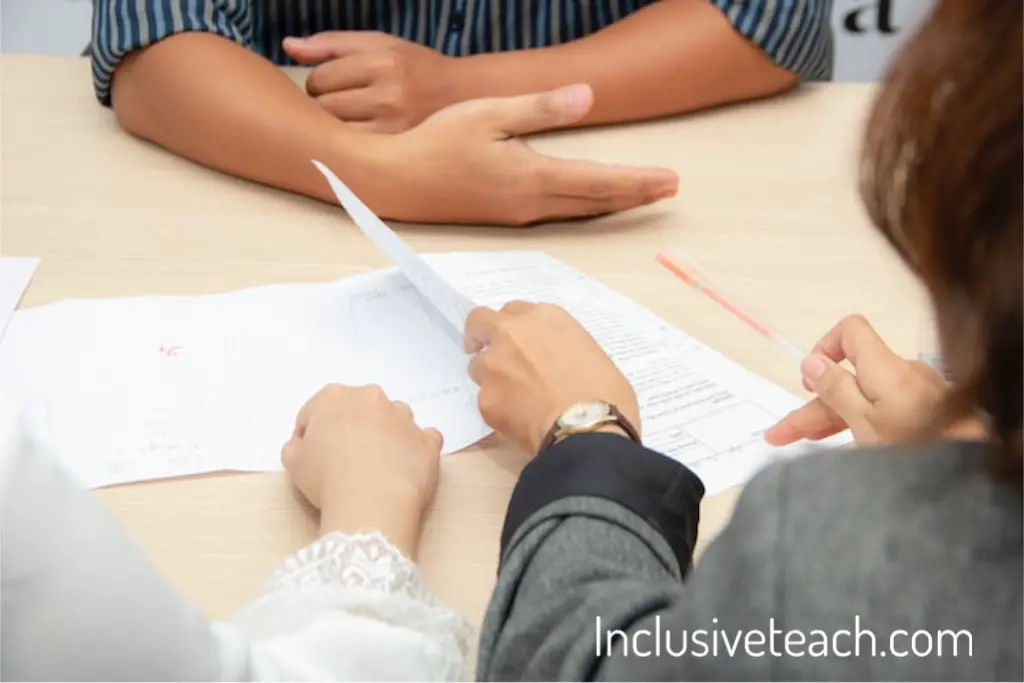
5 top tips for completing Headteacher application forms & Personal Statements:
- Follow the instructions carefully: Make sure to read the instructions and requirements for the application thoroughly and follow them closely. This includes following any formatting or word count guidelines.
- Use concrete examples: When answering questions or writing your statement, use specific examples to illustrate your points. This helps the shortlisting team better understand your skills and experiences and how they relate to the role. Were possible link the points in your personal statement with the person specification – in order.
- Proofread and edit: Make sure to proofread your application for spelling and grammar errors. Ask a friend or colleague review your application as well.
- Tailor your application to the role: Customise your application to the specific school and leadership role you are applying for. Research the school and consider how your skills and experiences align with their needs and goals. Quote their values .
- Be honest and authentic: Be genuine in your responses and don’t exaggerate or fabricate experiences. It is better to focus on a key accomplishments in depth rather than trying to cover too much ground.
Secret Tip 1: It will be the school governors/academy trustees leading on this process. Even a deputy headteacher position will have governor involvement.
Secret Tip 2: If you can find the school development plan on the website include any of your strengths or previous projects that could support this.
For more information on school leadership recruitment take a look at our post on Headteacher and SLT interview questions . We have also written about how to approach the challenge of a student panel interview.
Example Personal Statements.
Brevity and clarity are key here. Hit those person specification points within the restrictions set. Some jobs ask for 1 page of A4 for example. I suggest a maximum of 4 sides carefully spaced and formatted to ease reading. The personal statement examples below are to prompt your ideas only. The more senior the position the more detail will need adding. For each paragraph I recommend adding at least 1 example from your own experience.
Leadership Personal Statement Example 1:
As an experienced educator with a passion for inclusion, I am excited to apply for the position of Special School Headteacher. I have dedicated my career to supporting students with autism and other special educational needs, and I am committed to creating a safe and nurturing environment where all students can thrive.
Throughout my career, I have developed a deep understanding of the unique challenges faced by students with autism , including sensory sensitivities, communication difficulties , and struggles with emotional regulation . I believe that creating a safe and supportive environment is essential for helping students to succeed, and I have worked hard to develop strategies and programs that support their specific needs.
I am committed to safeguarding and have a thorough understanding of “ Keeping Children Safe in Education 2022 “. My mission has been to build a culture of vigilance and proactive measures to safeguard students from harm, abuse, and exploitation. I am committed to ensuring that all staff members are trained and equipped with the knowledge and skills to safeguard and protect our students.
I am particularly proud of my inclusive ethos , which emphasises the importance of creating an environment where all students feel valued, respected, and supported. It is essential to believe that inclusion is not just about meeting the needs of students with special educational needs, but about creating a school culture that celebrates diversity and promotes equity for all.
In my previous roles, I have developed strong budget management skills and strategic level management of large staff teams. I am confident in my ability to lead and manage a team of educators, creating a positive and supportive work environment that encourages professional growth and development.
While I have achieved many successes in my career, I recognise that there is always room for growth and improvement. That is why I value the opportunity to work with a coach to help me identify areas for development and improve my leadership skills. I believe that coaching can help me to become a more effective leader, better equipped to meet the needs of my students and staff.
Overall, I am excited about the opportunity to join your team and to continue making a positive impact in the lives of students with special educational needs. I am confident that my experience, skills, and commitment to inclusion and safeguarding make me an excellent fit for the position of Special School Headteacher. Thank you for considering my application.
Leadership Personal Statement Example 2:
As an Assistant Headteacher with 14 years of experience as a special school teacher, I am motivated to take on a leadership role in a school that aligns with my values of inclusivity and continual improvement. My commitment to teaching excellence is evidenced by positive feedback and a broad range of teaching experience with a hands-on and empathetic approach to creating a learning environment .
Throughout my career, I have been involved with continuing professional development (CPD) initiatives and have placed significant emphasis on encouraging staff to participate. I have also monitored pupil achievement and have created assessment tracking systems to improve attainment levels. Responding to budgetary demands as a middle leader, I have focused on maximising value to invest in my areas of responsibility, including communal and outside areas, to ensure an optimal learning environment.
My sensitivity to social and cultural diversity has led me to foster an open and inclusive environment that embraces my pupils’ backgrounds. I work to maintain positive dialogue with parents and to support groups such as EAL and SEN pupils. I believe that developing initiatives to address the links between social background and attainment is essential for school leadership. To achieve this I believe in making strong links with the local community .
As a leader of a large staff team, I value consultation processes and personal insights of staff members when leading a team. I am eager to involve middle leaders in initiatives aimed at improving the school’s performance. As per the DFE policy, I prioritise the safeguarding of pupils and have overseen child protection in my current role.
Leadership Personal Statement Example 3:
As an educator, I firmly believe that setting high expectations for pupils is essential to their success. In my experience, when students are challenged and held to a high standard, they rise to the occasion and achieve more than they ever thought possible. As a teacher, I strive to be an excellent practitioner by embodying this belief and consistently setting high expectations for my pupils.
One way that I have demonstrated my commitment to high expectations is through my work as a Middle Leader. Over the years, I have led both year groups and core subjects, and in both roles, I have been able to make a significant impact on the school community. Through my leadership, I have worked to ensure that my team of teachers shares my belief in high expectations, and that they are equipped with the tools and support they need to deliver challenging and engaging lessons. By working collaboratively with my team, I have been able to ensure that our pupils are consistently challenged, inspired, and motivated to achieve their very best.
Another area where I have excelled as an educator is in my approaches to curriculum implementation. I believe that every subject is essential and that every subject deserves to be championed. To this end, I have worked to ensure that my subject area is given the time, resources, and attention it deserves. By collaborating with other teachers and leaders, I have been able to share my passion for my subject and help others to see its value and importance. Through this approach, I have been able to champion my subject area effectively, ensuring that it is seen as an essential part of the school curriculum.
Being flexible and resilient are also key attributes for any successful educator. In my experience, the ability to adapt and respond to changing circumstances is essential to providing a high-quality education. Whether it’s adjusting to new teaching methods, dealing with unexpected challenges, or accommodating the diverse needs of pupils, being flexible and resilient is essential to success. I have developed these skills over time, and I am always willing to embrace change and try new approaches to teaching and learning.
Finally, I believe that a successful educator should make a contribution to the wider life of the school and community. As an educator, I am committed to going the “extra mile” for my pupils and their families, and I believe that this extends beyond the classroom. Whether it’s participating in extracurricular activities, attending school events, or volunteering in the community, I am always willing to do what it takes to support my pupils and their families.
In conclusion, as an educator, I strive to be an excellent practitioner with high expectations of my pupils. Through my work as a Middle Leader, my successful approaches to curriculum implementation, and my flexibility and resilience, I have demonstrated my commitment to providing a high-quality education. Furthermore, by making a contribution to the wider life of the school and community, I believe that I can make a positive difference in the lives of my pupils and their families. I am excited about the opportunity to continue growing and developing as an educator and to make a positive impact on the lives of my pupils.
Final Points
Remember a personal statement is – Personal to you! It is a chance to tell the panel shortlisting about yourself. If you want to gain an insight into their values try to look up the current headteacher and any governors on LinkedIn. There may be interests you have in common. The personal statement forms part of your application and may tick boxes that the interview doesn’t cover. The panel will also most likely ask questions based on what you have said in the form so be ready with examples.
Please share if you enjoyed this post.
Similar posts.

Why Boundaries Matter for All Children
Boundaries, Discipline and Behaviour Navigating the complex landscape of child discipline and behaviour management is a challenge faced by…

School Leadership Lessons from “Radical Candor”
“Radical Candor” is a management guidebook written by Kim Scott. The book focuses on the importance of developing strong…
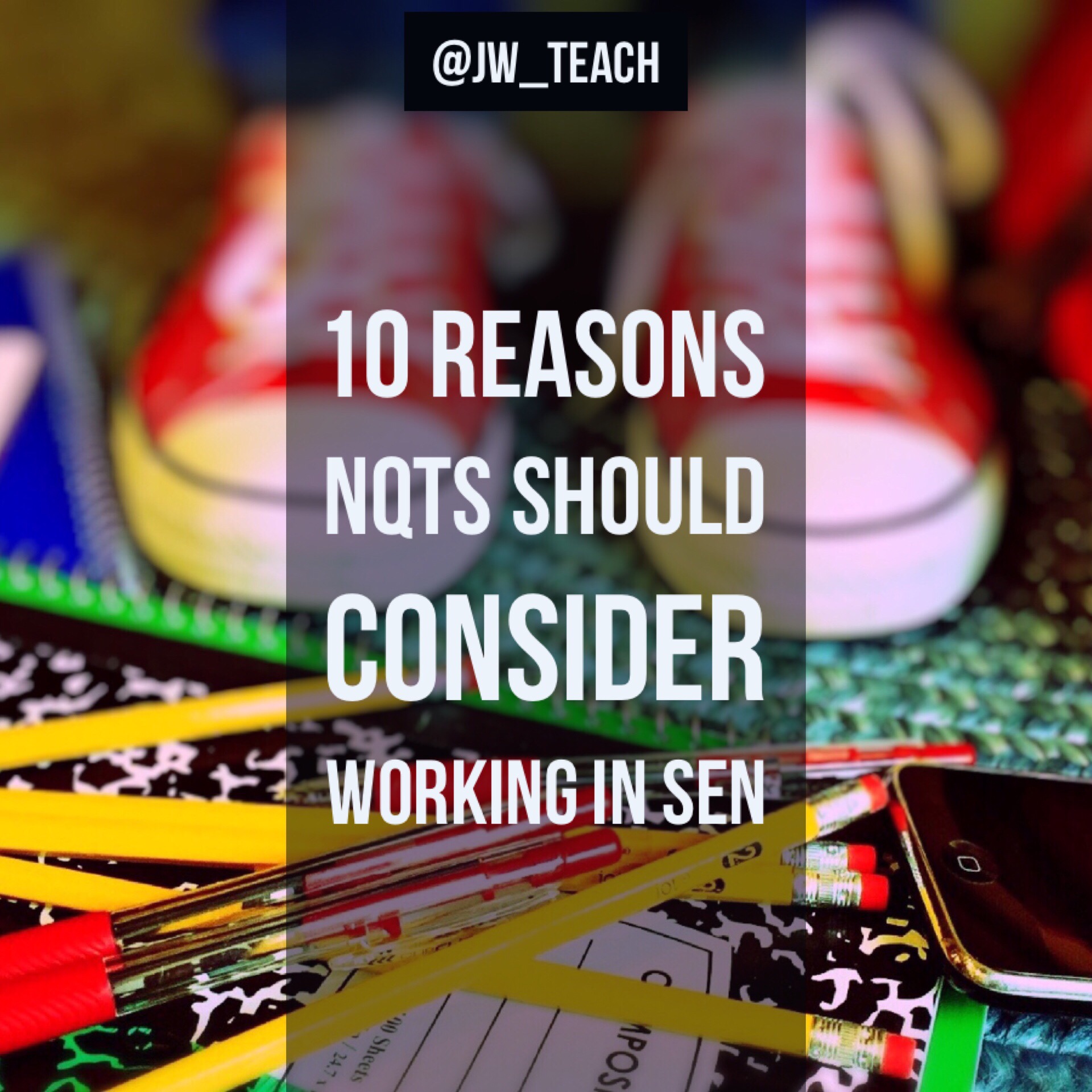
10 Reasons ECTs Should Work in Specialist Provision.
Early Career Teachers (ECTs) – Consider Special Schools when you are Job Hunting. If you are a recently qualified…
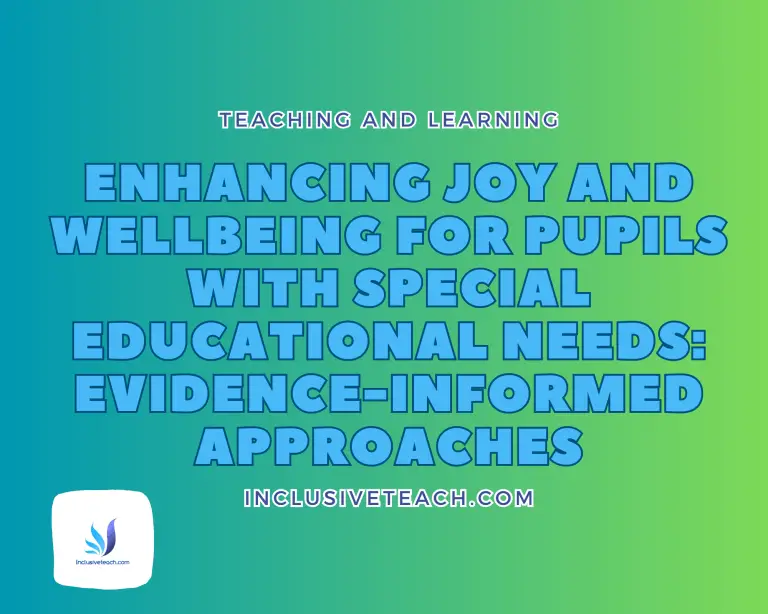
Enhancing Joy and Wellbeing for Pupils with Special Educational Needs: Evidence-Informed Approaches
Enhancing Joy and Wellbeing: The School of Joy! Education is the foundation of personal and societal growth. As teachers,…
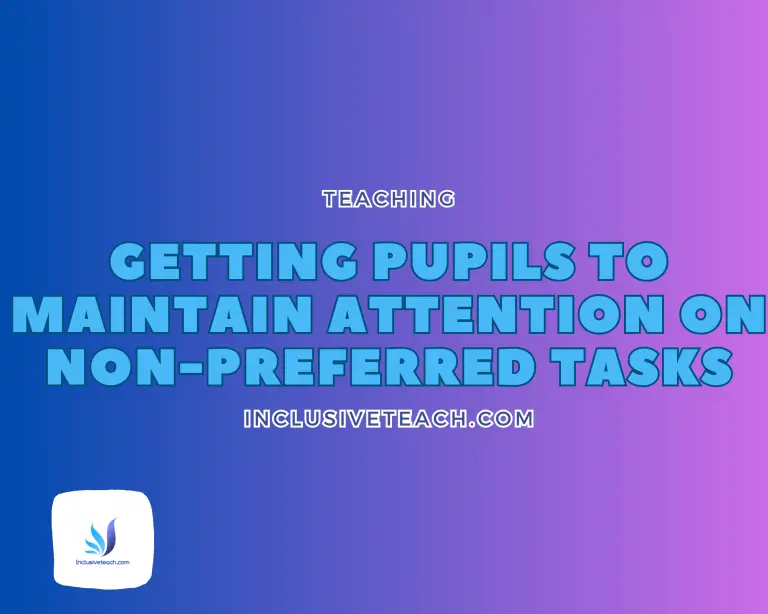
Getting Pupils to Maintain Attention on Non-Preferred Tasks
Many children with autism struggle with executive functioning. For these children, initiating tasks and sustaining attention, especially for non-preferred…
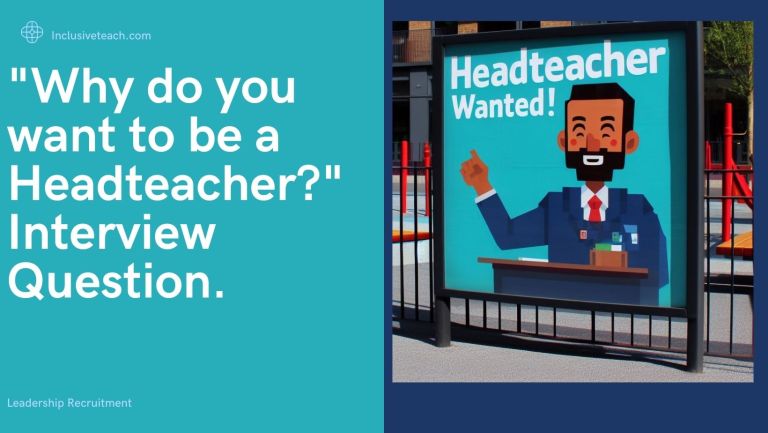
“Why do you want to be a Headteacher?” Interview Question.
Why do you want to be a headteacher? & Why do you want to be Headteacher of our school?…
One Comment
- Pingback: Imposter Syndrome in Education and Leadership and tips to try to reduce it
Leave a Reply Cancel reply
This site uses Akismet to reduce spam. Learn how your comment data is processed .
Discover more from Special Education and Inclusive Learning
Subscribe now to keep reading and get access to the full archive.
Type your email…
Continue reading
You must be logged in to post a comment.

IMAGES
VIDEO
COMMENTS
Keep It Concise and Well-Structured: Teaching personal statements should be clear, concise, and well-structured. Aim for a maximum of 500-600 words. Use headings or bullet points to organize your content. Start with a captivating opening paragraph and conclude with a strong summary of your qualifications and enthusiasm for teaching.
Here are a few teacher personal statement examples you can use as a reference when you're writing your own: Example 1: Entry-level teacher I recently graduated from Little Valley University with a bachelor's degree in early childhood education. I'm seeking the role of preschool teacher at your school.
How to write it. You can use up to 47 lines of text (4,000 characters) in your personal statement. Some word processing packages calculate line counts differently from the UCAS Teacher Training system, so you might need to redraft your statement if there's a discrepancy between the counts. Write in English (or Welsh if you're applying to ...
The personal statement presents the perfect opportunity to show you are an exceptional candidate, understand teaching and know the school you are applying to. It is not an easy task and is a tricky thing to get right. It requires being concise and clear - it shouldn't be too long or read like a list. You should talk about yourself and your ...
Mature students - getting ready to start your course. Mature students: five things to include in your personal statement. Preparing for study as a mature student - choosing where to study. Preparing for study as a mature student - student support. Preparing for study as a mature student - your qualifications.
The teacher training personal statement is your opportunity to let training providers know about your qualities, skills and expertise, and why you want to teach. While your application form briefly outlines your qualifications, skills and work experience, your teaching personal statement is where your personality shines through. ...
Teacher training personal statements: the dos and don'ts. An Initial Teacher Training (ITT) or teacher training personal statement is a key part of any initial teacher training application - it's your chance to sell yourself.. Your personal statement gives teacher training providers an opportunity to find out more about you - your motivations for pursuing a career in teaching, your ...
The ingredients of a convincing teacher training personal statement are: Passion for teaching. Express your drive and fire on the page. Be individual. Stand out in a positive light; one tip here is not to waste characters on quotes, they don't say anything about you. Convey your desire to work with children.
Broadly, the statement should cover these areas: • Why you want to become a teacher. • your transferable skills, knowledge and experience relevant to teaching and what they will enable you to offer a school. • your philosophy of education - what it's all about (and this might be where you want to include your thoughts on things like ...
Add details. Flesh out the points on your list by adding notes, specific examples or phrases. Then, take one point at a time and use it to form a sentence or paragraph. Don't worry about perfecting it at the moment - that will come later. Just make sure that what you're saying is a fair representation of you and your experience.
Search for roles. Your personal statement is your first opportunity to show the school you're a great fit for the job, and gets you closer to being shortlisted for an interview. The more you show how your skills and interests match the school's ethos and values, the better. We've spoken to a range of teachers to get their top tips for ...
Personalise your statement by writing in the first person, using 'me', 'I' and 'my'. Use action verbs such as 'coordinated', 'established' and 'managed'. Provide evidence of your motivation, experiences and qualifications as well as your understanding of teacher training and the role of a teacher. As the word count is limited for each section ...
A personal statement for teaching job explains how you demonstrate your description for the post of teaching. Moreover, the statement should be 200 to 500 words. You can include your strengths, skills and education. The ambition of a new teacher is to train children with their best capabilities and prepare the best nation.
5. Show off your strengths and skills. Use your personal statement to demonstrate what you, as an NQT, can bring to the school that no other applicants can. Achievements, professional goals, strategies you've developed; all of these will highlight what makes you unique and how you (and only you) can specifically help that school. 6.
Positive approach to provide challenge and support student success. Excellent behaviour management. Good communication skills with parents. Enthusiastic and creative approach to lessons. Teamwork. Willing to contribute to the wider life of the school. See our personal statement for secondary school teaching, below.
Read the job advertisement, website, and latest Ofsted report carefully. Make a list of requirements for the position and what is most important to the school's ethos. Connect your passions and experience to these things. For example, if the job advertisement asks for someone who is 'passionate about teaching', think carefully about what ...
Usually, a personal statement is approximately 200 to 500 words, but this may vary according to the employer's requirements. A personal statement includes an overview of who you are along with your strengths, work experience and education. The nature of your personal statement may vary depending on the type of teaching position.
Just start by showing your enthusiasm for the subject, showcasing your knowledge and understanding, and sharing your ambitions of what you want to achieve. Avoid cliches! Remember, this opening part is simply about introducing yourself, so let the admissions tutor reading your personal statement get to know you. Keep it relevant and simple.
Use emotional language to touch your reader. Help them imagine themselves in the situation you are describing. Help them feel what it was like in the situation that drove your desire in becoming a teacher. This is a major key in rousing your reader's emotions. 4. Make sure you start your personal statement strongly.
for requirements of each professional category). Within the personal statement, the nominee must provide a summary of the nominee's academic activities and professional development, along with objective evidence supporting the personal statement narrative. One effective approach is to use appendices for providing objective evidence, which is ...
Your personal statement can be up to 1000 words. 90% of successful candidates write 500 words or more. You could include: skills you have that are relevant to teaching. any experience of working with young people. your understanding of why teaching is important. your reasons for wanting to train to be a teacher.
Aimed at trainee teachers, this fantastic resource provides (ECT) NQT personal statement examples for you to utilise in your own writing. It lists a range of things you should consider and top tips for your statement. For example: Back up everything you write about with an example from your recent teaching experience.
Here are 16 personal statement examples—both school and career—to help you create your own: 1. Personal statement example for graduate school. A personal statement for graduate school differs greatly from one to further your professional career. It is usually an essay, rather than a brief paragraph. Here is an example of a personal ...
Example Personal Statements. Brevity and clarity are key here. Hit those person specification points within the restrictions set. Some jobs ask for 1 page of A4 for example. I suggest a maximum of 4 sides carefully spaced and formatted to ease reading. The personal statement examples below are to prompt your ideas only.
Generic statements unsupported by evidence are not given significant weight in the GS assessment. This means it is important to provide evidence to support a claim made by the applicant. We consider an applicant's overall personal circumstances when we assess whether they are a genuine student. What evidence and information to include